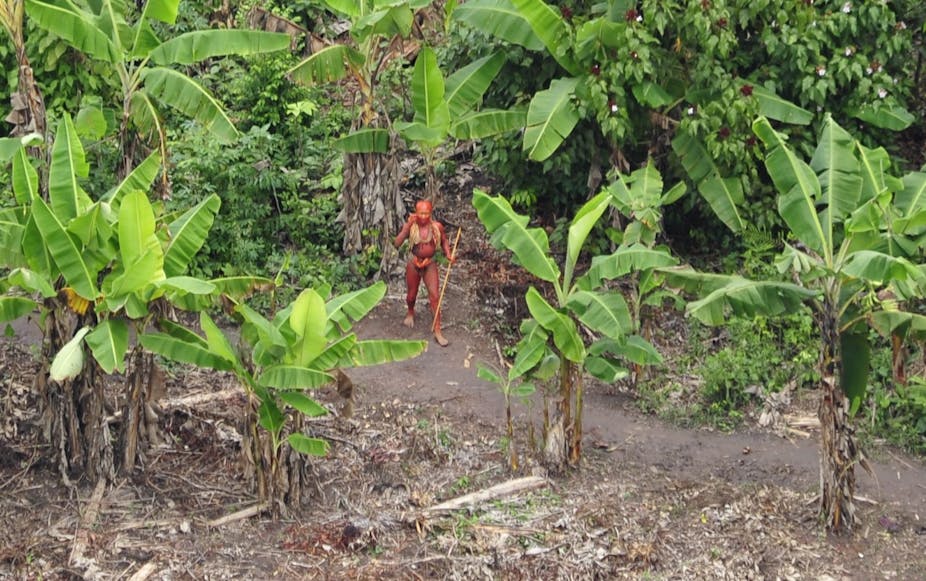Early this month, the Federal Court rejected Channel Seven’s appeal against an Australian Communication and Media Authority (ACMA) ruling that its program about the Suruwaha Indians was inaccurate and racist.
Among several absurd assertions the program made about this Amazonian tribe, the most egregious of all was that they killed their own children. Let’s get this clear: rare, if any, are the cases of infanticide in Brazilian tribes nowadays.
If anything, researchers have found that they care and worry about their children’s welfare. This is attested by anthropologists and FUNAI (the National Indigenous Foundation), an agency of the Brazilian government. So why does this old allegation keep returning, even in Australia, a country so distant from Brazil?
As I’ve written elsewhere, this is serious business.
Throughout Brazilian history, government, religious and economic forces have made a concerted effort to contain, if not erase, its indigenous population, to open their land for mining and agriculture.
These efforts have always been justified by white elites through universal principles of humanitarianism. In their attitude, they implicitly affirm that these tribes are backwards, barbarians, and “living in the Stone Age”, as Channel Seven put it. Therefore they need us and our civilisation to progress, and we are nothing but kind to bring it to them.
More recently, in the 1970s, the Brazilian government built the Transamazon Highway as a strategy to open up the Amazon for business. The Transamazon crossed indigenous land, bringing with it disease, alcohol, prostitution and loss of culture. It also failed to bring development to the region.
Since the beginning of the 21st century, this development-at-any-cost policy has been revived. Large chunks of the Amazon are being cleared for cattle grazing, soya and sugarcane plantations, prospecting for oil and gas, and the construction of the Belo Monte and Tapajos river dams.
In a way, this has been a successful policy. It has placed Brazil among the new economic giants, the so-called BRIC countries (Brazil, Russia, India, China). However, for indigenous tribes this policy meant that their land was invaded by mining, agribusiness and oil corporations, as well as the military, bringing with them more disease, prostitution, alcohol, death and environmental destruction.
In addition to economic forces, an American Christian fundamentalist organisation Youth with a Mission has been actively working to eliminate indigenous culture. They offer medical treatment in exchange for conversion and have been mounting a campaign to remove the children from tribes, so that they can be educated in Christian values.
As part of this campaign, they hired indigenous people to play scenes of infanticide in a film called Hakani. The so-called “documentary” was shared thousands of times on YouTube and on Facebook to the horror of those who watched it unaware it was fabricated.
In a way, this was the same strategy Channel Seven employed in making their film. We now know they asked the Suruwaha Indians to remove their Western clothes and to paint their bodies. The Australian journalists chose the strongest and best-looking ones for the scenes.
Hakani has been used by powerful Brazilian Evangelical congressmen to draft laws that legalise Indigenous children removal. Indigenous people are the weakest side in this culture war and lose everything: their land, culture and children.
Is that what “civilised peoples” do? Do they take children away from their parents based on a lie repeated too many times?
This, of course, is not very different from the strategy of removing children from Aboriginal families in Australia. In Australia, the Stolen Generations policy was justified on the grounds that children would be better off growing up in white, “civilised” families. White Australians in charge of removal declared that the mothers would soon forget their children.
More recently, we can see the same strategy of de-humanising vulnerable minorities for one’s own gain in the Children Overboard incident in 2001. Then Howard government ministers alleged that asylum seekers had thrown their children overboard to force the government to rescue them and take them to Australia. Howard won the elections on the back on this lie.
In good dog-whistle style, you could hear the government whisper: “They don’t value their children. They are not like us.”
The same whispers could be heard about the USSR during the Cold War. Sting was spot on when he sang: “The Russians love their children too.”
Now, can we please stop endorsing this idea that we are the paradigm of civilisation that others desperately need?

